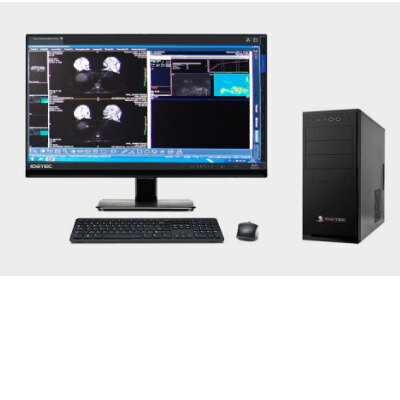FLT- PET Imaging Technique May More Quickly Predict Response to Cancer Treatment
By MedImaging International staff writers
Posted on 10 May 2011
New imaging technology may soon help predict the effectiveness of cancer treatment, even before the treatment is complete. Posted on 10 May 2011
A new US National Cancer Institute (NCI; Bethesda, MD, USA)-funded clinical trial is using a novel positron emission tomography (PET) imaging modality that could improve the early detection of tumor growth during treatment for esophageal and lung cancer.
Led by Dr. Clifford Chao at NewYork-Presbyterian Hospital (New York, NY, USA), Columbia University Medical Center (New York, NY, USA), and Weill Cornell Medical College (New York, NY, USA), the ongoing pilot employs PET scans with a radioactive tracer molecule called fluoro-L-thymidine (FLT)-PET. The study, one of the first in the United States to use this technique for esophageal and lung cancer, represents a continuation of more than 10 years of research by Dr. Chao and others and builds on evidence that FLT-PET may be more effective than the traditional method using fluorodeoxyglucose (FDG)-PET.
"Every cancer is slightly different, and response to chemotherapy and radiotherapy is not always predicable. Our goal is to develop a quicker and more effective way to see how a treatment is working while the patient is undergoing the therapy," stated Dr. Chao, radiation oncologist-in-chief at New York-Presbyterian Hospital, chairman of the department of radiation Oncology at Columbia University College of Physicians and Surgeons and chief of the division of radiation oncology at Weill Cornell Medical College. "Today, we have to wait six to eight weeks. Our hope is that FLT-PET will shorten this time significantly."
If shown successful, Dr. Chao said, FLT-PET could "allow us to better tailor treatment to meet the specific needs of individual patients, limiting their exposure to chemo and radiation, and more quickly make any necessary adjustments to their treatment plan."
The approach is designed to visualize big changes in tumor growth. This works for cancers like esophageal and lung cancer that are treated with radiation and chemotherapy prior to surgery, Dr. Chao explained. It is not intended for breast cancer or other cancers in which surgery is the first course of action, followed by radiation to the surgical margins and chemotherapy to kill any miniscule amounts of cancer remaining.
The new study is recruiting 100 patients with esophageal or lung cancer. They will receive FLT-PET prior to radiation and chemotherapy, then again three weeks later, along with several other routine diagnostic procedures. With FLT-PET, the patient is injected with the FLT tracer and then given a PET scan. The PET machine creates a three-dimensional (3D) image of the tumor area based on the distribution of the tracer. Investigators will compare and evaluate the FLT-PET results to conventional pathologic evaluation based on surgical specimens.
Investigators will determine whether the experimental method is more effective than the standard PET technique. The traditional FDG tracer is an analog for sugar and shows how sugar is metabolized in the patient's body. By contrast, FLT is an analog for an organic compound called pyrimidine, which is the building block of DNA synthesis. Dr. Chao reported that the latter approach is much more sensitive and better able capture cancer-cell activity. He cited early nonclinical studies showing that FLT is able to detect significant changes in tumor proliferation as soon as one day after treatment.
Related Links:
NewYork-Presbyterian Hospital
Columbia University Medical Center
Weill Cornell Medical College














